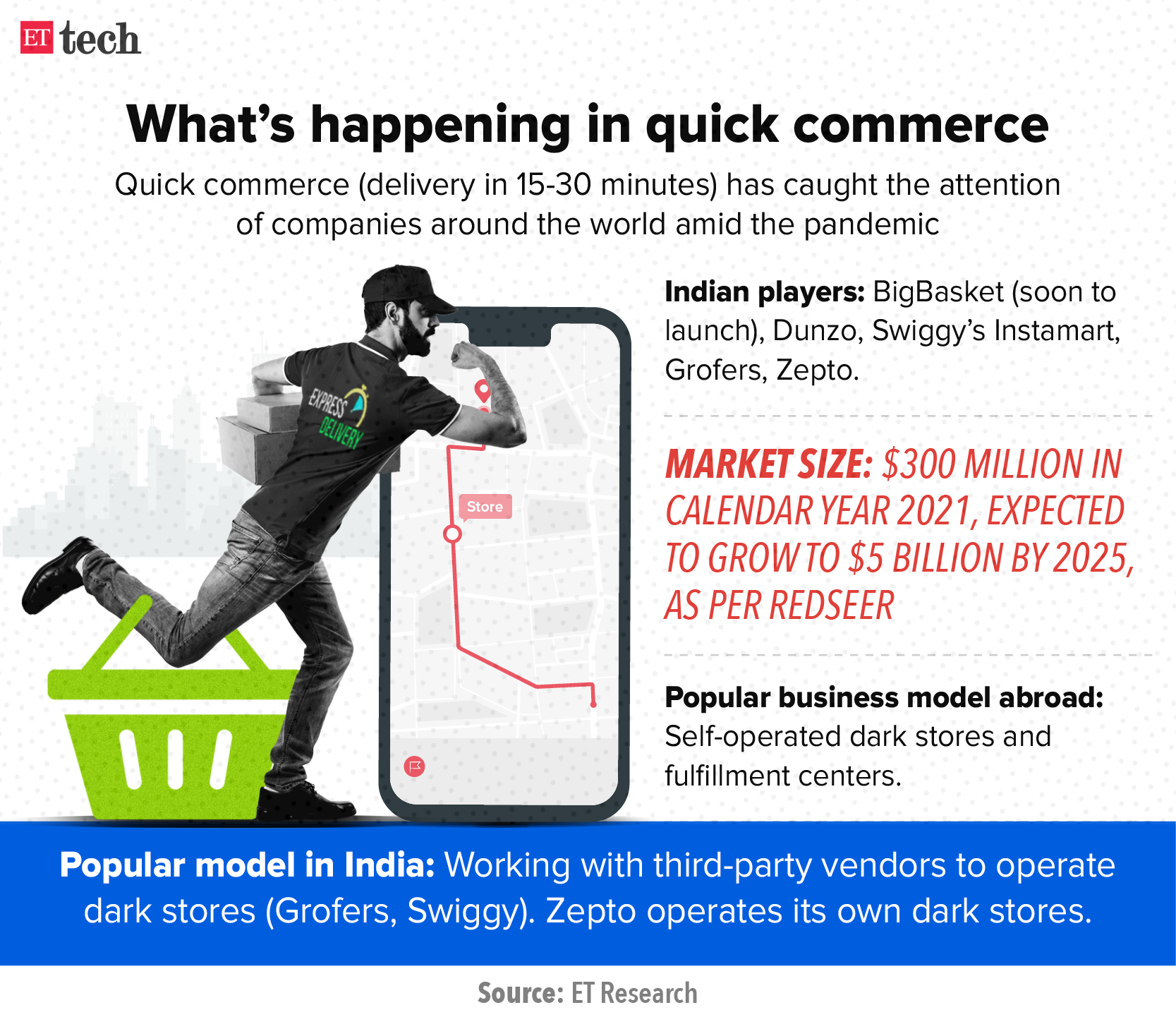Also in this letter:
- Crypto platforms seek clarity on taxes after crackdown
- Startups roll out new strategies to hire the young
- Inside the war for tech talent in India
Grocery and hyperlocal are focus areas for Flipkart, says CEO
Flipkart CEO Kalyan Krishnamurthy
Flipkart will scale verticals such as grocery, hyperlocal deliveries and its value-focused platform Shopsy, having invested in these areas over the past year or so, CEO Kalyan Krishnamurthy told us in an exclusive interview.
Time to focus: He said the Walmart-owned company will double down on these bets and also move forward on healthcare and travel, in which it made strategic investments last year, instead of diversifying further this year.
Mum on IPO: On the company’s IPO plan, which ET has reported is planned for this year, Krishnamurthy said, “We have not had a discussion with the company board on the IPO so far and are not ready to share a specific timeline.”

“The penetration of categories like grocery—which is 70% of commerce in India—is probably 1%. That has to go up to 5-10%. The value segment has to open up and we have entered new categories like travel and health… The way we think about this is that we need to continue driving adoption with these businesses and a natural outcome of this would be an IPO.”
On the competition: Flipkart’s Shopsy, which was launched last July last year, faces competition from SoftBank-backed Meesho, Tiger Global-backed DealShare and Singapore-based Shopee. In the so-called ultra-fast delivery segment, Flipkart Quick is up against Swiggy’s Instamart, Blinkit (formerly Grofers) and Mumbai-based Zepto.

But Krishnamurthy said that despite the entry of younger firms, competition in the ecommerce space has not changed much in the past few years. “We don’t believe the new players are playing with the level of capability and depth needed for ecommerce in India. It doesn’t matter how much capital you bring to the table, that’s not the way you can win ecommerce in India,” he said.
On quick delivery: “I don’t think that’s (15-minute delivery) the right long-term customer model. We would look at a more sustainable business which offers it in 30-45 minutes with good value and selection. That’s the way we look at the convenience business rather than force-fitting a consumer need which is actually not there in the market.”

So why is so much money being poured into this space? “I think there is probably a view that new customer habits can be created and moats can be built. But to build something like that, major investments will be needed.”
Crypto platforms seek clarity on dues after taxman’s crackdown

Cryptocurrency platforms are seeking clarity on which provisions of India’s indirect tax regime apply to them, as regulators investigate a slew of ventures on charges of tax evasion.
Catch up quick: On December 31, we reported that the Goods and Services Tax (GST) department had begun an investigation into the activities of cryptocurrency exchange WazirX for allegedly evading Rs 40.5 crore in tax. The tax department recovered Rs 49.2 crore from the company—the GST owed plus interest and penalties.
Following this, the Directorate General of GST Intelligence cracked down on other crypto platforms, including Buyucoin and Unocoin. “Around half dozen offices of cryptocurrency service providers have been searched and massive GST evasion has been detected,” sources told ANI.
Confusion: Industry members said crypto platforms have failed to pay the “correct” amount of GST largely because of confusion over which provisions apply to their specific business models. For instance, exchanges such as WazirX and CoinDCX, which facilitate peer-to-peer transactions and charge a commission on each transaction, count this as their main source of revenue. Others such as Unocoin and CoinSwitch Kuber also act as a broker or an aggregator and buy and sell cryptocurrency to users, making profits on these trades.
It is this second model that is stoking greater regulatory scrutiny, executives said.
Quote: Sathvik Vishwanath, cofounder of Unocoin, said, “They (DGGI) are looking at the different models and asking us for an explanation on how we account for transactions and they’re collecting the GST that was missed.” He added that there were some business model categorisation issues, because of which it was unclear how much tax the exchanges needed to pay.
Tweet of the day
Startups roll out new HR strategies to hire the young

Employees at Meesho can now take a couple of days of ‘celebration leave’ to take a new car for a spin, moving into a new house, or any other milestone. InMobi on the other hand has rolled out an auto-approved, no-questions-asked leave policy that employees can use at any time.
These startups, and others such as Innovaccer, Licious, and Instamojo, are dropping one-size-fits-all HR policies for customised, new-age policies as they seek ways to better engage with their young employees in a work-from-home world.
In their words: “The talent that we hire is quite young, and we find that the thought process and requirements of the next generation are very different,” said Ashish Singh, chief human resources officer (CHRO) at Meesho. “What worked for others doesn’t necessarily work for them, and so we design all our policies from that perspective.”
Who’s doing what? Meesho also recently rolled out a pet adoption policy, allowing new pet parents one week of leave to bond with their pets and help them settle in.
- Wakefit.co has rolled out an OKR (objectives and key results) programme for better transparency.
- Bengaluru-based unicorn Licious, an online meat and seafood retailer, has removed any upper limit on sick leaves as part of an effort to build a culture of care and trust.
- Health-tech unicorn Innovaccer is trying to make work more fun for young talent.
Inside the war for tech talent in India

The technology industry’s talent crisis will spill over into 2022 as the demand for good talent continues to rise.
- India’s technology sector, which includes IT services, global MNCs and startups, employs over 4.6 million people.
Such as the digital talent gap that India will struggle to meet technology resource requirements for the next 3-4 years, according to industry data. Teamlease expects full-time employee attrition is expected to touch 24% and contract staffing attrition to touch 49% by March.
Analysts said the talent shortage is both short-term and long-term, led by a post-Covid boom in demand for IT and engineering talent.
Who’s doing what? Companies such as Wipro and HCL Technologies have announced specific training and hiring plans for such professionals. Wipro has announced that a third of its tech workforce comprises cloud professionals while HCL recently announced plans to hire additional 10,000 people for its AWS unit.
TCS recently noted that over 95% of its new deals were coming from digital transformation requirements while Infosys is training over 5,000 hyperscalers every month.
Top trends in 2022: Tech talent will be increasingly represented at management and board level across businesses, not just at CTO level.
- Remote hiring and working will expand scope for talent from beyond Tier I cities.
- More companies will follow TCS, Infosys in rolling out platform qualifier tests instead of campus hiring.
- Companies will increase investments in hiring software and technology.
- Rise in demand for jobs in product based companies rather than service based companies which perform better on quality of life metrics for employees.
Exclusive: Ex-Myntra CEO’s venture could soon be worth $100 million

Former Myntra CEO Amar Nagaram
A brand new startup is in talks with investors such as Falcon Edge and Accel Partners to raise $25-$30 million in its first round of funding at a valuation of $100 million, several sources told us.
The kicker: The company, founded by former Myntra CEO Amar Nagaram, doesn’t even have a name yet. If the deal goes through at a $100-million valuation, it will be among the most valuable idea-stage startups ever.
China model: The unnamed venture will focus on creating customised fashion products based on consumer needs and will rely on the consumer-to-manufacturing model.
Chinese company Shein is among the first ones to execute this model, which helps reduce the cost of storing inventory while catering to specific needs of customers.
“They will look to solve consumer needs in fashion through technology and deploy the Chinese model of manufacturing goods based on the orders being received,” a source said.
Club Myntra: Myntra cofounder Mukesh Bansal, who now runs Curetfit and is a president at Tata Digital, will also invest in a personal capacity in the startup, sources said.
Nagaram worked at Flipkart for almost seven years before moving to Myntra as its CEO in 2019. Its previous chief executive Ananth Narayanan had quit shortly after Walmart acquired the Flipkart Group in August 2018.
In May 2021, Narayanan founded the ecommerce rollup firm Mensa Brands, which went on to become a unicorn in just six months when it raised $135 million in a round led by Alpha Wave Ventures in November.
Nandita Sinha has been Myntra’s CEO since November, a month after Nagaram quit to pursue his own venture.
Done Deals: Meanwhile, Cloud telephony major Exotel has raised $40 million in Series D funding led by Steadview Capital as it looks to transform itself into a complete customer engagement platform and grow its footprint in the Middle East and Southeast Asia.
And Groyyo, a business-to-business manufacturing and automation company, has raised $4.6 million in a seed funding round led by Alpha Wave Incubation. The company said it will use the funds to build its teams across key manufacturing clusters in South Asia, and to expand into the United States and the Middle East.
Delhi HC gives Whatsapp more time to respond to CCI notices

On Monday, the Delhi High Court gave Facebook and WhatsApp more time to reply to two notices from the Competition Commission of India (CCI), which is probing the messaging app’s updated privacy policy.
WhatsApp and Facebook have challenged CCI’s June 4 and 8, 2021, notices respectively, asking them to furnish certain information for the purpose of inquiry conducted by it.
A bench of Chief Justice DN Patel and Justice Jyoti Singh noted that the data protection bill was yet to be passed and, therefore, adjourned the proceedings to March 30.
The court was hearing the appeals of Facebook and WhatsApp challenging its single-judge order dismissing their pleas against the probe ordered by the CCI. “Till then the time to file replies to the June 4 and June 8 notices issued by CCI… is extended,” the bench said.
Other Top Stories By Our Reporters
Cloud solutions will drive IT solutions for the foreseeable future: By 2025, over 95% of new digital workloads will be deployed on cloud-native platforms, up from 30% in 2021. In 2022, global cloud revenue is estimated to total $474 billion, up from $408 billion in 2021. (read more)
Tech is now allowing nations to almost walk away from globalisation’: Governments have realised that if they want to stay relevant and compete, they will ultimately need to use technology to enforce their will, geopolitical futurist Abishur Prakash says. (read more)
IT firms likely to see strong revenue growth in Q3: The December 2021 quarter earnings season will begin later this week or early next week with industry leaders TCS and Infosys announcing their numbers. (read more)
Global Picks We Are Reading
■ Instant delivery startups test a new tactic: Slower delivery (The Information)
■ Elizabeth Holmes found guilty of fraud in Theranos trial (Bloomberg)
■ Apple becomes first company to hit $3 trillion market cap (Reuters)
Today’s ETtech Morning Dispatch was curated by Zaheer Merchant in Mumbai. Graphics and illustrations by Rahul Awasthi.
























